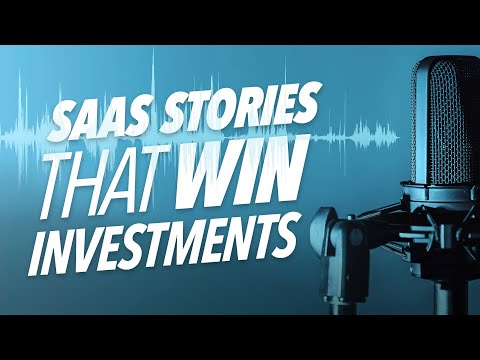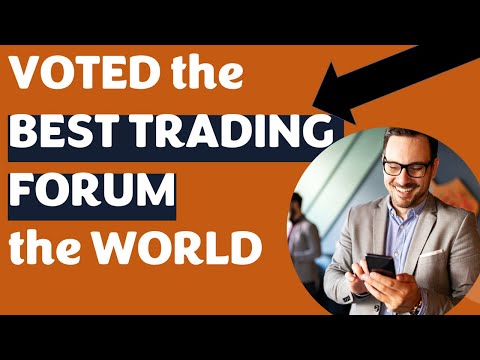How To Attract The Perfect Investor To Your SaaS Business

- Startups are like the whole time it's, you're fighting against a headwind. Like you're not supposed to win. (upbeat music) What is up and how you doing today? - I'm doing great. Thank you. And thanks for having me. I'm delighted to have this opportunity.
- Yes. Well, I'm excited. Why don't we start off with you sharing what your startup is and then the story? But like, if we just think about like, what's the product called? Who do you serve, and how does it work? How would you answer that? - Yes, so we're building Imagination, which is a metaverse for work to help remote and hybrid teams to thrive. And to help their managers, manage with empathy, basically.
- So metaverse for work. Is this kind of like a virtual workspace? - Correct. Indeed. A digital office. We start off 2D, we build it out to 3D with specific rooms where they can co-create, collaborate, chill-out, play together.
So basically everything we've been building for years in the agency, but all wrapped into a digital office space. - Well, tell me how you came up with the idea. - Well, actually it's a long time brewing. So we had the agency, we had a lot of work done through the gamification agency. And the pandemic fastened up our process to build a SaaS.
And basically from being a remote manager myself, I saw a problem where you don't know who's doing what, when, where, and how are they performing? Do they need support? Do they not need support? So to give a bit more help to all those managers that are struggling in a hybrid environment that we're all living in now, and to sort of say, Hey, here, we have a solution for you. We've worked at ourselves this way for years, and now we've put it into a package as a SaaS. - I love it.
So this is super cool. So definitely trends like working on trends in the market, your experience, domain experience, consulting, and where are you connecting from? Just so that everybody gets a sense of your accent and where you're building a business from? - (laughing) Actually, Stockholm Sweden. And the company is both in London and in Stockholm.
So we have two offices. - International SaaS. How can I help? - Well, actually we've been building alongside the agency. So one of the things that is always a challenge is managing the double hats and we are raising investment because we want to really get into the metaverse and be seen as a player alongside some of the others. So raising investments while running so many hats as a founder, I find really challenging.
So is to which hat am I wearing? How can I attract investors who know me from the agency space? I don't have a track record in SaaS. And I still want to convince them to go on the journey with me. So there's probably three questions in one, is there's an element of managing my responsibilities as a founder, attracting investors and selling the SaaS. We do want to shut down the agency operation altogether. So that's very clear for me is just, for the short term whilst we're building, we need the income all the same.
- So there's two parts of this. There's the transitioning of the services into the SaaS. And then there's the narrative of the services to the SaaS for investors. Let's break these apart into separate problems we're trying to solve.
On the agency to the SaaS, obviously somebody writes you a check for two million dollars tomorrow, problem is solved. But let's say that doesn't happen. The process typically that I recommend to people is figure out what that amount is. What is the amount of revenue that is gonna be required for you guys and your core team to support itself? 'Cause like there's always the option to wind down and wind up. And sometimes team members from the services side. It's a framework I teach called services to SaaS.
Sometimes the team members may not be the right team members. And the mistake people make is to try to bring people with them that are not the right fit for the SaaS. They could be great for consulting, great for services, not great for startup world.
As you can imagine, those are sometimes two different personalities. - I think so. - Totally. So figure out what it is that the team needs to look like and then figure out what the revenue needs to look like, and try to keep your most profitable customers, get rid of the noisy ones, and try to get them on maintenance mode so you can focus on this. And then obviously if the funding comes in, it's a non-point.
That's just like a high level the way I think of like transitioning from services to SaaS, I've done this myself. I had a consulting company called Spear. We did a couple of million dollars a year in services and then slowly transitioned into more product led sales process. And the way I did it, when it comes to like, just even thinking through like, where do I focus my time? I use theme days, and I do this today. I actually run. I'm the CEO of two companies today.
One of them is called SaaS Academy, the other one's called High Speed Ventures. So SaaS Academy is for coaching, is the largest coaching group in the world for B2B SaaS founders. And then High-Speed is essentially my family office where I deploy my own money to buy software companies, and take all the things that I've learned, scaling them as a company myself and then as a coach. They're separate teams, like literally I have a complete separate co-founder partner, Matt on the High Speed side, totally different team, operational executives on this side. And I run both, but the way do it is I use theme days.
So Monday, Tuesdays and, Monday, Tuesdays, and Wednesdays are one company, and Wednesdays and Fridays are a separate company. And that way, when like opportunities come into my world, I know where to put them. My assistant knows how to schedule them. I know where to put my block time for projects.
And then what you can do is just start with like two days on the startup, three days on the services and then slowly migrate your way over. And this is good for anybody trying to start a side hustle. It's like, can you give up Fridays to your side pestle, and then can you give up maybe Fridays and Tuesdays? And then eventually, maybe Fridays and Thursdays and Tuesdays. And then eventually it's like, I'm only doing one day a week on the old stuff, I'm doing most of my time on the new stuff.
That's just for me, the way my brain works, where I'm like a very much a block time kind of guy. I wanna block it out. I wanna just have clarity and where it spend time.
That's what works for me. Some people can manage multiple things. My brain doesn't work that way. And then I would say on the investor side.
Here's the best way for me to answer this 'cause I've had to think through this a dozen times. I've helped probably 300 friends, clients migrate a funding round while they were the CEO of a service company and move over. And what I'll share with you is there's a perfect narrative.
So I'm gonna give you the perfect narrative, and then to the degree that you can fit your story to that narrative arc is the degree that you can like easily raise. Or, and I always say to people, it's not like, can you. Everybody can raise money.
But do you raise quickly from high quality investors or you raise slowly from low quality investors? Low quality investors are like real estate investors, high net worth people have no idea of tech. Like they're just pays it in the bulk. The narrative arc is this, because of our background in services in the previous years of domain experience and all this stuff, we seen this opportunity metaverse in your case. So we seen there's this like thing that we noticed. And when we started talking to the market, knowing what we know about what we've done, because we've been doing this for a decade, they started asking us to build them this thing.
And then we went and we like talked to a lot of people. And as we were talking to them, they all agreed this is something we want. And that led us to product.
Or early commitment or sign contracts, or like insert the thing it led you to. But it's like, because we were in this world, we saw this art thing that told us we should try to figure out if there's a there, there, if the dog, what is it? And we built this thing. And now with this thing, we're showing it to people and they're just blown away and they want it. And that's the reason why we're raising capital.
As an investor, investors want to be sold. Like I tell this to people often it's like, an investor wants to take risks. They just don't wanna take risks with things that can be mitigated, like product market fit, like the team. But they want the story. They wanna feel like they found the deal. They found this thing in the market.
That was like, not a lot of people knew about and this person. So it's always like, is this the right team to do this? Meaning what's their background, their domain experience and pedigree? A service company is actually like the best; Shopify, FreshBooks, Basecamp, they all came from consulting and building tools for themselves. - I didn't know that. - Most people don't know this. I would say if I had to guess 60 to 70% of SaaS companies were built and pulled out of consulting.
Because it's in consulting. That's why when people say you can't pre-sell enterprise. Every day, I'm making this number up, but it's probably like $50 billion a year of custom software is built. Custom software is pre-selling. When Procter & Gamble hired Tata Consulting to build a custom ERP solution that does this unique thing that they can't find in the market. That's pre-selling 'cause if you were any company that had a product that was gonna do what Tata said they would do, or got paid to spec out, and your product did that for a fraction of what this consulting company is gonna charge.
You could've got the contract. So to me, it's actually a really great story to say. - [Woman] Position. - We know how to do this.
We've been doing this and we're gonna go build this, and we already have an audience in a market and all that stuff. And I think. - Amazing. - I don't think there's any negatives to it.
Like I think there's a undertone of the question that says, well, does our investors wanting to fund the services company that's got the SaaS in 100%? Like, I would love that because I know that, like I was looking at a deal recently and the founder got paid, I think it was like 400 grand in the last year to do the custom, the script that he built to manage infrastructure as a DevOps SaaS company. He got paid 80 grand a client to deploy the script. And he's saying, Hey, I'm just taking this thing and making it available in the cloud.
And then people have to pay me 80 grand. They can pay me a 1,000 bucks a month to do the thing. Like, he just proved that there's a market there by the consulting. That's where I think investors will a 100% support that.
- Support that. 'Cause I mean, we have found a few investors, but we're nowhere close to what we require to basically get the service part to close, and move everything forward. - And don't underestimate customer financing.
Like to me as you know we've been working together for a while in my Growth Accelerator programme. - Thank you. - No, it's been super fun seeing you show up and like continue to pivot and iterate. - It has been a journey enough I have to say. (laughing) - That's normal.
Like that's the entrepreneurial journey. I think finding customers that have the pain that are willing to pay a premium to have early access to something, that's the most beautiful form of funding you can find. That's the way I've always done it. Because it's why I always tell entrepreneurs, if you wanna start a business, the best business to start is an events business, and the reason why is it costs nothing to get started.
All the lessons you'll learn to build an event. So I have a friend, Chris, who's producing this Web3 event and I'm not involved. Like, I mean, I try to say, I'm not involved, but like, we went for a hike.
I was like, somebody should create this. Chris, you're not busy right now. 'Cause you exited your company. You should do it. And I'll recruit the speakers.
So like I'm not involved, but I am. But Chris runs it, anyways. The event itself will expose you to every aspect of building company. Like you literally, like, I gotta convince a stranger to speak at my event.
I need to manage logistics. I need to negotiate contracts. I need to sell.
I need to promote, I need. So it's just but there's no commitment long-term. So it's this beautiful little world of, so like the more I say this and like you could even consider it for your stuff. Like if you created this like one day virtual event for the buyer.
And I actually have a framework called the Virtual Summit Creator, which is the same concept. So if you knew who your buyer was in the enterprise and you organise an event, you can use the event to attract them, to build the list of. Like if I was selling a Web3 retail finance tool, I literally am gonna have 150 people attend this event that I could then at the end or in the middle at lunch, get on the stage and go, like, here's a problem that you're probably experiencing. I've built this tool that helps you solve that.
If you guys are interested in learning more about that tool, I'll be at the back of the room. Come talk to me, we're looking for early adopters, and the room would flood to me, and I would pre-sell my products. It's just another strategy. - And are they something that I could do because I have a history in speaking? So I definitely think that's a really fantastic opportunity and hosted on the platform we're building. - Maybe.
I mean, this is like every business decision there's risks. So it's like, you could do that, but like how many people are not gonna be able to join, how many people are gonna have to technical difficulty, and which is great. It's just like, do you wanna put the risk of the sales process in front of the risk of the product technology risks? I mean, there's always like an everything in startup world, there's always a bit of magic. Like nobody wants to talk about it, but I will tell you, I mean, some of the stories.
I've done my own way, I'm really proud of, but like some of my favourite is like one, this guy, Terry Matthews out of Canada, he back in the day, he was trying to sell to like this big company. And when I say magic, it's a little like hand-waving like, it's perception. Like if you have photo on your website with the logo, your logo on the side of a building, even though you don't have an office, but people's perception is that that's your building, sometimes in early days. I always say in the early days you gotta do stuff that doesn't scale.
And honestly, sometimes it's not legal. Like you can't follow every letter of the law, like just HR laws, like, and you know this, it's like. I'm not saying break the law is that everybody should what they wanna do, but I'm just saying like, we gotta create magic sometimes. So Terry Matthews needs to sell this like enterprise customer. And he convinces a dentist to lend him his office, change the sign on the outdoor plaque, like the little slip thing to the company name and then put the logo in the waiting room, and then made sure that they like, it was his friend that was a dentist.
And then the people came, they did it on a Saturday. 'Cause he said like, I'm travelling. I can't meet with you, but I'll go to the office on Saturday. If your executives could fly in, they flew in, waiting room, sat down, came into the boardroom, had the meeting and ushered them out. I think the dentist open off open at like 10:00 AM and they had to get everything like turned back over.
And I just love, I know I love that kind of stuff. Like I love the, Hey, this doesn't make sense, but we're gonna do what we need to do to give ourselves even a fighting chance of succeeding. Because the truth is, is startups are like, the whole time it's you're fighting against a headwind.
Like you're not supposed to win. I mean, unfortunately that's just the truth. The odds are against us. - You really think so.
I mean, I have to say the last two years I've been basically and exercising resilience in pivoting from, yes, this works. No, we don't get traction. Next part, we don't get traction. It's part of learning when to spot the signs that something's good enough. And with this one, we finally have a lot of interests probably also, because it's a metaverse, which is totally topical right now. But it's actually what we've been building all along.
It's just packaged differently. So that we're heating the team manager rather than the HR person, which was great advice you gave me out when we met in Canada. That may be the person with the purse is not HR, turns out that's not HR. So totally good advice.
So the lower hanging fruit is actually the team lead. - But you made a good point as we wrap up, I want everybody to hear this is people need to understand that it's the entrepreneur's decision on how we package something. And sometimes people take too long to do this, and they just feel because it's hard, I'm supposed to do it.
And it's hard. There's also this concept of like being pulled into a market. Like, you know. And this is why I've always loved about living in San Francisco for five years was on a daily basis, I would get to practise my perfect intro. My buddy clay taught and I teach all you guys, or just your elevator pitch, like dozens of time.
And because you have dozens of time to practise by the second and third week, it's pretty good because you're tweaking, you're saying, we do this for this. It's like, oh, that didn't work. We do this for this. Oh, okay, that makes sense.
And then how does that work? Well, it works like this, didn't understand it. It works like this. It's kind of like that. And then, and I feel like that's a part where I see sometimes founders struggling with traction in their market. They're just, I've been at this for two years and it should be going.
And I just, I tell them, it's like, the core idea might be great, but the way you're positioning it and packaging it is the challenge, because a product needs product market fit. It needs to resonate with the gap. Like I always say like, who has your biggest unmet need? And if you feel like you're pushing, then that should be feedback for the entrepreneur, but you gotta be honest. Like how many conversations did you have? Did you have two conversations? That's not enough. If you do 20 and only one out of 20 was mildly interested, there's something wrong, iterate, iterate, iterate.
And it sounds like that's the journey you've gone through. And now there's finally a thing that the market is now saying, oh, we're talking about this in our meeting. So can you please come into our world and help us with this? And I think that's something that every entrepreneur needs to understand is a decision about the business. Like that's people think it's, I hope they understand that it's a strategic business decision that they should be considering. It doesn't mean, 'cause I used to call it pivot or persevere.
Do we keep doing this and persevere or do we pivot? And that was a meeting we had every second Friday when I was building clarity. And it was just this supply the idea. - I think it was a call you had with us at the beginning, we're in the middle of the pandemic, in the Growth Accelerator, which was exactly that what you just said. - Pivot or persevere. - And that really helped and stuck with me that sometimes you have to give up on some of your babies and that's okay. (laughs) And you just pivot it and move away.
And I think that's what we've been doing for the past few years. - The idea of having the meetings. The meeting idea is so that nobody thinks that you're uncertain.
It's this beautiful, like, Hey, every two weeks we're gonna reassess it. And if we're all agreeing, we're gonna keep going, but we're not gonna do it blindly 'cause we said we would. And I think that's the entrepreneurial art that sometimes people have a hard time with that I try to give these little mechanics to help people think through.
But and based on everything I've shared, what's the one thing you're gonna commit to moving forward from our conversation? - Actually, I'm taking the narrative and pushing it straight away into our decks towards investors. So it's taking that agency narrative combining it, 'cause I often forget where we've come from. I sort of feel well that was done and need to move forward.
So taking that, putting in our deck and the next investors will be hit with it. So it will be a straightaway impact. - I'd love to hear that.
Well, it's been fun, really appreciate time and hope you have an amazing rest of the day. - Likewise, and thank you so much for having me on this call. - Talk soon.
Cheers. - [Woman] Thank you. (upbeat music)
2022-03-30 01:04


